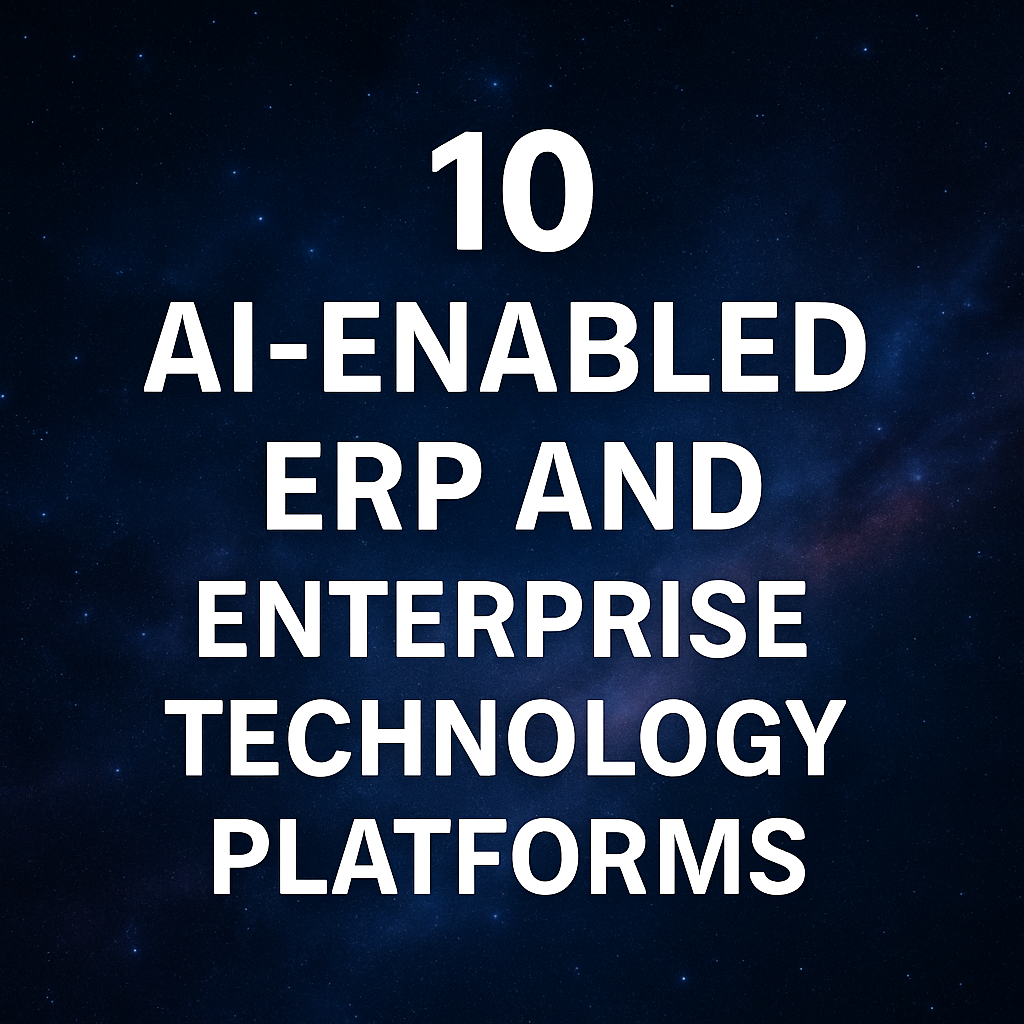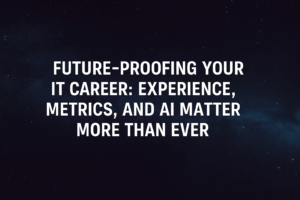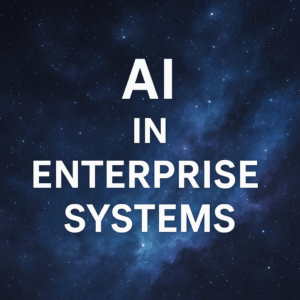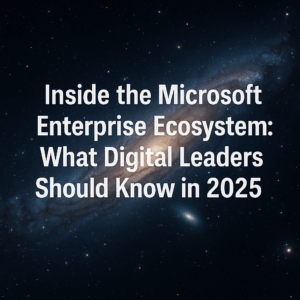Artificial Intelligence (AI) is quickly becoming the cornerstone of modern enterprise software. ERP vendors and enterprise tech providers are racing to embed AI into their platforms—not just for automation, but to drive intelligent decision-making, predictive insights, and adaptive business processes.
But the AI maturity curve varies wildly. Some vendors are ahead of the curve, using AI to transform how work gets done. Others are merely checking a box. If you’re evaluating enterprise technology in 2025, understanding where vendors truly stand on AI is critical.
In this post, we reveal the Top 10 AI-enabled ERP and enterprise platforms making the biggest impact—with insights from our hands-on experience guiding clients through digital transformation worldwide.
Table of Contents
ToggleWhy AI Matters in ERP and Enterprise Software
AI is more than a buzzword—it’s reshaping how businesses operate. From streamlining the financial close process to improving demand forecasting and customer engagement, AI enables organizations to:
- Reduce costs and manual effort
- Increase data-driven decisions
- Improve process agility
- Enhance customer and employee experiences
When selecting an ERP system, understanding the depth and usability of AI features is as important as evaluating functionality or cloud readiness. Companies that fail to account for AI will find themselves at a strategic disadvantage over the next 3–5 years.
If you’re evaluating ERP systems or undergoing a tech overhaul, Third Stage Consulting provides independent, vendor-agnostic guidance to help you choose the right platform for long-term success.
Top 10 AI-Enabled ERP and Enterprise Platforms in 2025
These are the platforms we believe are setting the bar for AI innovation across ERP, CRM, finance, HR, and other enterprise functions:
#10: Odoo – Democratizing AI for SMBs
Type: Open-source ERP
AI Strengths: Order processing, accounting automation, financial close
Best For: Small to mid-sized businesses (SMBs)
Odoo stands out as a flexible, modular ERP system that’s gained popularity in the SMB market. What sets Odoo apart is its open-source foundation and low-cost entry point—making AI capabilities accessible to smaller companies that otherwise might be priced out.
AI in Odoo helps automate everyday tasks like generating invoices, managing approvals, and forecasting inventory needs. While its capabilities may not be as advanced as Oracle or SAP, it brings practical AI to companies that need it most.
For fast-growing businesses seeking affordable innovation, Odoo is a compelling option—and one to watch as AI becomes more deeply integrated into its modules.
#9: Rapid – A Composable, Low-Code AI Disruptor
Type: Composable ERP / Integration Platform
AI Strengths: Cross-system orchestration, microservices, data unification
Best For: Companies with complex tech stacks or legacy systems
Rapid isn’t your traditional ERP. It was built to break apart the monolithic ERP model and replace it with flexible, microservice-based architecture. The platform excels at stitching together multiple applications—including legacy systems—and injecting AI throughout the integrated workflow.
Its low-code development environment empowers IT and business users to create intelligent automations without extensive coding. AI is embedded not just for analytics, but also to trigger contextual actions based on user behavior or data anomalies.
Founded by Yan Bond (of Baan Software fame), Rapid offers a fresh alternative to traditional ERP—a forward-looking platform ideal for companies modernizing without a full rip-and-replace.
#8: ServiceNow – AI for Workflow and Service Management
Type: Workflow automation and ITSM platform
AI Strengths: NLP-driven case resolution, HR ticketing, IT operations
Best For: Large enterprises managing complex service environments
While not a full ERP suite, ServiceNow plays a crucial role in many enterprise tech stacks—particularly for IT service management (ITSM), HR, and customer support. Its AI capabilities shine in high-volume environments where automating case triage, routing, and resolution can save massive time and cost.
Through native AI models and ongoing acquisitions, ServiceNow has invested in industry-specific AI use cases, enabling predictive insights and real-time assistance across digital workflows. Think chatbots that resolve employee issues, HR systems that predict turnover, and IT platforms that detect incidents before they happen.
ServiceNow’s depth in these niches earns it a solid place on this list.
#7: Oracle NetSuite – Cloud-Native and AI-Ready
Type: Mid-market ERP (Cloud SaaS)
AI Strengths: Financial close, supply chain forecasting, customer orders
Best For: Mid-sized organizations seeking scalable, cloud-native ERP
NetSuite was built for the cloud—and that gives it a key advantage in deploying AI. Its AI tools are designed to work across finance, operations, and CRM functions, using real-time data to improve forecasting, cash flow visibility, and supply chain management.
Oracle has steadily integrated Fusion AI into NetSuite’s core features, providing automated suggestions, anomaly detection, and intelligent dashboards. Its low-maintenance cloud delivery model also reduces the burden on IT teams.
For companies that need a robust, mid-market ERP with embedded intelligence and enterprise-grade capabilities, NetSuite remains a top choice.
Watch our breakdown of NetSuite AI features on the Third Stage YouTube channel.
#6: Workday – AI-Powered People and Finance Operations
Type: HCM and Financial Management Platform
AI Strengths: Talent acquisition, workforce analytics, financial forecasting
Best For: HR- and finance-driven organizations
Workday is best known for its strength in human capital management—but its AI capabilities go beyond basic HR tasks. It uses AI to optimize hiring pipelines, recommend internal mobility paths, and detect anomalies in financial reporting.
Unlike legacy ERP providers, Workday’s platform was built with AI and data modeling in mind, giving it a head start in delivering predictive workforce insights and financial planning tools.
As AI becomes a differentiator in how companies attract talent and manage resources, Workday is carving out a strong leadership position.
#5: Oracle Cloud ERP – Enterprise AI at Scale
Type: Full-suite Cloud ERP
AI Strengths: Fusion AI across finance, SCM, HCM
Best For: Large enterprises needing global scale and mature AI
Oracle’s cloud ERP platform is one of the most AI-rich enterprise solutions available today. Oracle’s Fusion AI suite is embedded across its applications, enabling organizations to automate financial close, optimize inventory, and make smarter staffing decisions.
Thanks to Oracle’s massive install base, the system trains on a huge volume of industry-specific data, giving it a powerful AI feedback loop. Oracle also benefits from its investments in cloud infrastructure and industry verticals, which support tailored use cases like healthcare claims automation or retail demand forecasting.
If you’re a global enterprise seeking AI to streamline operations and drive data-informed leadership, Oracle Cloud ERP is hard to beat.
#4: Microsoft Dynamics 365 – OpenAI-Powered AI for Everyone
Type: ERP + CRM + Business Apps
AI Strengths: Copilot for finance, supply chain, sales, CRM
Best For: Businesses already in the Microsoft ecosystem
With the integration of Copilot (powered by OpenAI), Microsoft Dynamics 365 is bridging the gap between generative AI and enterprise workflows. Whether you’re closing the books, managing inventory, or communicating with customers, Copilot provides real-time assistance—drafting reports, surfacing insights, and automating tasks.
The seamless integration with Microsoft 365 means users can work inside familiar tools like Excel and Outlook while benefiting from AI intelligence behind the scenes.
Microsoft’s unique partnership with OpenAI also gives it access to some of the most advanced LLM technology on the market—making it a long-term AI frontrunner.
#3: Salesforce – AI-First CRM and Beyond
Type: CRM + Platform-as-a-Service (PaaS)
AI Strengths: Einstein AI across sales, service, marketing
Best For: Sales- and service-driven organizations expanding into ERP
Salesforce has invested heavily in embedding its Einstein AI model across the platform, not as a bolt-on, but as a core feature of workflows. Einstein powers everything from lead scoring and churn prediction to content recommendations and chatbot interactions.
What makes Salesforce different is its extensibility via the Force.com platform—allowing third-party developers to build ERP-like features on top of Salesforce.
For customer-facing organizations seeking to integrate front-office and back-office intelligence, Salesforce delivers AI at both the macro (data analytics) and micro (task automation) levels.
#2: SAP S/4HANA – AI + Scale + Industry Depth
Type: Full-suite ERP
AI Strengths: Conversational AI, predictive modeling, process automation
Best For: Complex enterprises with diverse operational needs
SAP’s new AI companion, Joule, brings conversational capabilities into the massive S/4HANA ecosystem—allowing users to complete tasks and retrieve information without navigating menus. Joule helps users handle supply chain planning, financial transactions, and production management more intuitively.
SAP also has a major advantage with its 30,000+ customer base feeding AI models in real-time—creating a rich training dataset for industry-specific predictions.
Its deep industry alignment (from manufacturing to public sector) and embedded AI tools give SAP the edge for large enterprises with complex needs.
#1: Palantir – AI Overlay for Legacy System Optimization
Type: AI + Data Integration Platform
AI Strengths: Predictive analytics, process orchestration, legacy augmentation
Best For: Data-rich organizations with fragmented systems
Palantir isn’t an ERP system—it’s a hyper-intelligent layer that connects and enhances existing systems. Often used in government, healthcare, and manufacturing, Palantir allows companies to leave their legacy systems in place while layering on AI-driven workflows, reports, and predictive tools.
This makes it ideal for organizations that can’t afford a total tech overhaul but need modern AI capabilities. Palantir specializes in:
- Data modeling
- Workflow automation
- Cross-functional AI integrations
Its ability to unify data without disruption is why it lands the top spot on our 2025 AI-enabled enterprise platform list.
How to Choose the Right Platform
Your organization’s AI maturity, industry focus, and digital goals should determine which platform fits best. Some questions to ask:
- Is your business cloud-ready?
- Do you need industry-specific capabilities?
- Are you replacing legacy systems—or enhancing them?
- What role should AI play in your transformation?
Third Stage Consulting helps organizations define strategy, evaluate software, and plan for implementation—so you’re not just buying features, you’re building futureproof capability.
🎯 Download the 2025 Digital Transformation Report
Want to compare more software platforms, benchmarks, and transformation best practices?
📥 Download the 2025 Digital Transformation Report from Third Stage Consulting—free, detailed, and 100% independent.
📺 Watch More on YouTube
Explore these topics in video format on the Third Stage YouTube Channel—including ERP vendor breakdowns, digital transformation strategies, and behind-the-scenes analysis of enterprise tech trends.






